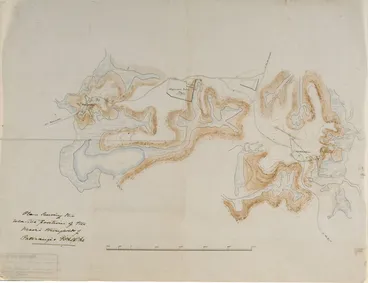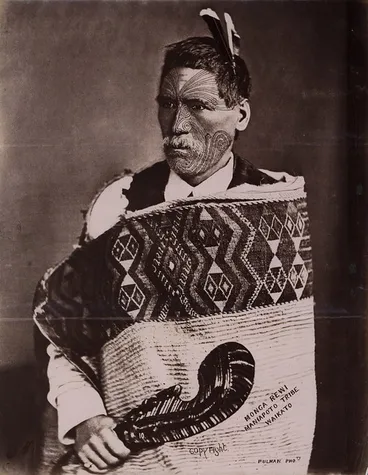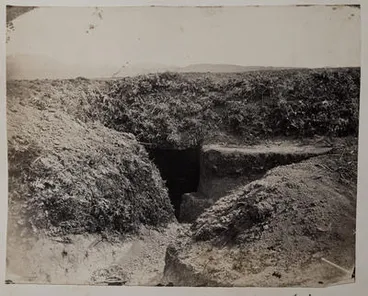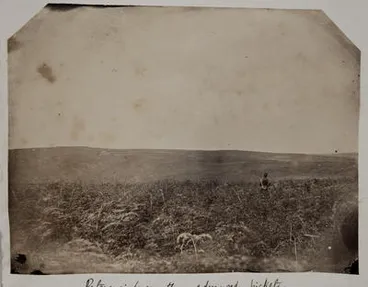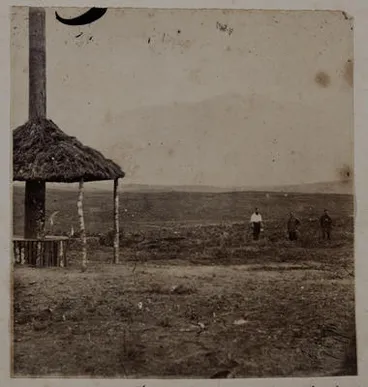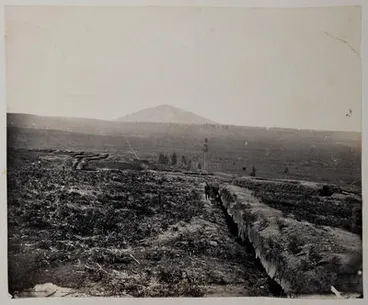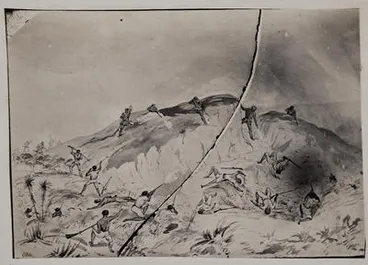Pāterangi - January 1864
A DigitalNZ Story by Janice
Pāterangi was considered the greatest defensive line by Ngāti Maniapoto Māori. Here are images and articles on the attack of the pā in 1864.
Pāterangi Pā 1864, New Zealand wars, Land Wars, War in the Waikato
Rewi's plan of defence at Pāterangi
Ngāti Maniapoto leader Rewi Maniapoto had been against building the pā at Rangiriri. He had instead focused on the construction of a defensive line centred on Pāterangi in south Waikato, between Te Awamutu and the Waipā River. A series of fortifications at Te Rore, Pikopiko and Ōhaupō protected Māori from an attack from either the Waipā or Horotiu rivers. More importantly, unlike Meremere and Rangiriri, Pāterangi could not be outflanked by river. The complex consisted of 2 km of trenches, with critical junctions supported by redoubts.
Source: 'The invasion continues', URL: https://nzhistory.govt.nz/war/war-in-waikato/invasion-continues, (Ministry for Culture and Heritage), updated 9-Apr-2019
Rewi Maniapoto
Archives New Zealand Te Rua Mahara o te Kāwanatanga
One of the shell proof retreats in the native fortress at Paterangi New Zealand
Auckland War Memorial Museum Tāmaki Paenga Hira
Cameron's force
In addition to Imperial troops there were Colonial Defence Force and volunteer cavalry and two companies of Forest Rangers. Pikopiko was bypassed and by lunchtime on the 29th Pāterangi was in sight.
Source: 'The invasion continues', URL: https://nzhistory.govt.nz/war/war-in-waikato/invasion-continues, (Ministry for Culture and Heritage), updated 9-Apr-2019
Paterangi, 1864
Manatū Taonga, the Ministry for Culture and Heritage
Paterangi from the advanced pickets. This photograph was taken under fire. New Zealand
Auckland War Memorial Museum Tāmaki Paenga Hira
The King's flagstaff in the Fortress at Paterangi
Auckland War Memorial Museum Tāmaki Paenga Hira
View of the lines of rifle pits connecting the redoubts at Paterangi Kakepuku Mt in the distance New Zealand
Auckland War Memorial Museum Tāmaki Paenga Hira
Attack at Waiari
Hoping Cameron would attack as he had done at Rangiriri, the garrison became frustrated with his cautious strategy. For three weeks artillery shelled the pā occasionally and there was some long-range sniping. Māori referred to this period as ‘Maumau Pauru’ (‘waste of gunpowder’).
On 11 February some of the Māori at Pāterangi attempted to force the issue by attacking a party of soldiers at the advanced camp at Waiari.
Source: 'The invasion continues', URL: https://nzhistory.govt.nz/war/war-in-waikato/invasion-continues, (Ministry for Culture and Heritage), updated 9-Apr-2019
The fight at the 2nd parapet at Waiari
Auckland War Memorial Museum Tāmaki Paenga Hira
The Engagement at Waiari - The New Zealand Wars: A History of the Maori Campaigns and the Pioneering Period: Volume I (1845–64)
Victoria University of Wellington
Pāterangi NZ Wars memorial
This memorial obelisk is located on farmland on Bird Road, halfway between Pāterangi and Pirongia, west of Te Awamutu. The memorial marks the graves of six privates of the 40th and 50th regiments who were killed in action at Waiari on 11 February 1864.
Source: 'Pāterangi NZ Wars memorial', URL: https://nzhistory.govt.nz/media/photo/paterangi-nz-wars-memorial, (Ministry for Culture and Heritage), updated 3-Apr-2019
